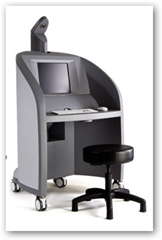Technology in healthcare is rapidly moving into the area of “behavioral diagnostics” and I am saying this with a bit of humor here, but gee look at all the time and money that could have been potentially saved on one Presidential candidates campaign. Now that the Supreme Court seems to think that companies should have the ability to add whatever amount of money they want to contribute, I do believe we should take the proper steps here to ensure that the candidates we elect to office are not suffering from ADHA, seriously here. Look at what we are getting and what we see in the news, it worries me that there might be a lot of this floating around Washington, and thus the reason we had the type of state of the union address we heard last week.
President Obama‘s “Behavioral State of the Union Address”– Jon Stewart Comments (Videos)
We all talk about becoming more involved in our own healthcare and frankly at this point I think that includes members of Congress, we want to know what we are getting for our buck or the vote. Not only do insurance companies want to “cherry pick” the cream of the crop, but we as citizens now would like to have the same ability here, we want to “cherry pick” those candidates too (grin). Why not? Truth of the matter is there’s probably a tiny bit of ADHA in all of us at any given time, but let’s use this technology and identify this matter before all those dollars get spent, just like healthcare insurers do. I read the description from a company website below and darn if there are not some things to think about, which means that the male counterparts have 3 times the risk here. This is good news for Nancy Pelosi and other female representatives by all means. “Risk for accidental job failure” listed below somehow sticks in my head (grin) and it stresses how early detection can be helpful.
“Attention-deficit/hyperactivity disorder (ADHD, or AD/HD) is a common condition of the brain that makes it difficult to control behavior. Everybody knows  someone with ADHD. It affects approximately 9.5 million school-aged boys and girls, adolescents and adults. People with ADHD have trouble paying attention, controlling impulsive behaviors, and in some cases, are overly active. Three times more boys are diagnosed with ADHD than girls. Symptoms persist into adulthood in as many as 60 percent of cases. Although these characteristics are present to some extent in everyone, when the symptoms are developmentally extreme, pervasive and persistent, it might be ADHD.
someone with ADHD. It affects approximately 9.5 million school-aged boys and girls, adolescents and adults. People with ADHD have trouble paying attention, controlling impulsive behaviors, and in some cases, are overly active. Three times more boys are diagnosed with ADHD than girls. Symptoms persist into adulthood in as many as 60 percent of cases. Although these characteristics are present to some extent in everyone, when the symptoms are developmentally extreme, pervasive and persistent, it might be ADHD.
Although individuals with ADHD can be very successful in life, without identification and proper treatment, ADHD may have serious consequences, including school failure, family stress and disruption, depression, problems with relationships, substance abuse, delinquency, risk for accidental injuries and job failure. Early identification and treatment are extremely important.”
Here’s a picture of the device, and it is all software driven, so again I make note of the fact that algorithms are running our lives today, as discussed at DAVO.
Do Algorithms Run Your Life- DAVO 2010
From this article and the way investors are dropping in some millions to keep this going, do you think they know something we don’t? Again, there’s a bit of my wit included here, but you know what, this is what is being developed for the goose so how about the gander. Would you as a citizen like to know what kind of a candidate is running for office. Again I referenced the John Edwards story. We might have a little less excitement in the news stories but there’s enough other information out there to report so I don’t think we are going to be facing a huge void in news. Let’s maximize the use of tech technology so we can all get break and get away from the ideals of “it’s for those guys over there”. (grin)
As citizens of the US, we want to participate and join in the “cherry picking” process just as soon as it becomes available and let’s get our candidates and representatives the treatment they deserve and may need! BD
BioBehavioral Diagnostics Co., which is developing a system to diagnose attention-deficit hyperactivity disorder, closed a $7 million tranche in a Series B round it hopes will reach $10 million.
The Westford, Mass.-based company said it will use the money to expand its sales and marketing operation and fund additional clinical work for its Quotient system.



0 comments :
Post a Comment